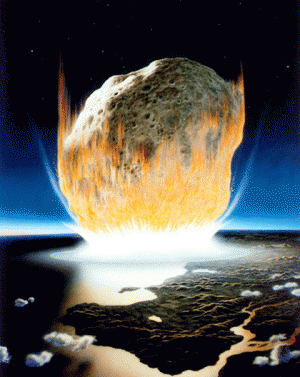July 24, 2013 report
Researchers offer explanation for higher survival rate of freshwater organisms after Chicxulub asteroid impact

After studying what likely occurred in the aftermath of Earth being struck by the Chicxulub asteroid, a team of researchers in the U.S. has found evidence to suggest organisms in freshwater lakes and streams fared far better than did organisms that lived in the oceans. In their paper published in Journal of Geophysical Research: Biogeosciences, the team offers an explanation of why freshwater fish and other organisms had lower rates of extinction than did those that lived in the sea.
The Chicxulub asteroid struck the planet approximately 66 million years ago leaving a giant crater off the Yucatán Peninsula. Most scientists now believe it was the cause of non-avian dinosaur extinction. It is believed the impact was so great that debris was pushed high up into the atmosphere all around the planet—as the debris fell back to Earth it would have heated up causing organic matter on land to ignite, further contributing to material spewed into the air. In this new effort, the researchers looked at what impact such falling debris likely had on marine and freshwater ecosystems.
They suggest that organisms that lived in the sea likely experienced little harm directly after the impact, as hot air temperatures weren't likely to warm surface seawater much. Afterwards, however, there was likely a much bigger impact. That was because of the dust that remained in the atmosphere for months, or even years—it would have prevented plankton, which lives near the ocean's surface, from receiving sunlight, causing it to die. That would have set off a chain reaction, as organisms that fed on plankton would die of starvation leaving no food source for those that fed on them. The result the team says was the extinction of roughly 50 percent of all the organisms that lived in the world's oceans.
In contrast, they claim, organisms that lived in the world's freshwater lakes and streams fared much better. This they suggest was because freshwater fish and other organisms, such as amphibians, would have been much better suited to handle such an Earth altering event. They note that many types of fish are able to go dormant, for example, during the winter and could have done so in a cloud-filled colder Earth. Also, running water in rivers and streams is naturally aerated, and would thus have continued to offer organisms that lived in them a strong supply of oxygen. Organisms that live in fresh water environments also are able to move from less habitual water to zones known as refugia where conditions were more favorable. Because of all of these factors, the researchers say, freshwater extinction rates were as low as 10 to 20 percent.
More information: Journal of Geophysical Research: Biogeosciences DOI: 10.1002/jgrg.20086
© 2013 Phys.org




















